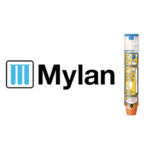 Mylan (NSDQ:MYL) CEO Heather Bresch reportedly accepted “full responsibility” for the company’s EpiPen price hikes that sparked outrage over the past 2 months, but defended the company’s actions while blaming an opaque industry that she said was not built for consumer engagement. The CEO made her remarks at the Forbes Healthcare Summit in New York on Thursday.
Mylan (NSDQ:MYL) CEO Heather Bresch reportedly accepted “full responsibility” for the company’s EpiPen price hikes that sparked outrage over the past 2 months, but defended the company’s actions while blaming an opaque industry that she said was not built for consumer engagement. The CEO made her remarks at the Forbes Healthcare Summit in New York on Thursday.
“There are unintended consequences when the patient goes to the pharmacy counter and doesn’t know what the price will be,” Bresch said, according to Stat. “Transparency would improve this.”
The Canonsburg, Pa.-based company has been under fire since August when reports surfaced that it raised the price of its emergency allergy drug device by 500% since it acquired the product from Merck (NYSE:MRK) in 2007. Mylan has been scrutinized by lawmakers over the last 2 months, including at a Congressional hearing in which Bresch maintained that Mylan is committed to making the lifesaving treatment available to any patient that needs it. The company is developing a generic that will be offered for $300, half the current price of the brand name product.
Centers for Medicare & Medicaid reported in November that Mylan underpaid CMS for its auto-injector by misclassifying the device as a generic. Mylan agreed to pay $465 million to settle the claims, but the federal government has not acknowledged the deal. In the settlement, Mylan said it will reclassifying the EpiPen as a branded drug in April 2017, which means the company will pay 23% in rebates instead of 13%.
Bresch defended the company’s price hikes, saying that Mylan invested more than $1 billion to create access for patients and improve the product.”There’s a lot of misinformation out there, but we now reach 80% more patients than when we acquired EpiPen,” Bresch said at the industry conference. “The idea that there was no advancement in the product was inaccurate.”
The pharmaceutical industry’s pricing problems came to the forefront of public discussion last year, after Turing Pharmaceuticals raised the price of its malaria drug Daraprim from $13.50 to $750 a pill. But this year, Mylan has become the poster-child for industry greed for many politicians. Bresch said yesterday that her company’s experience could serve as an example of the upfront costs that people with high-deductible health plans encounter at the pharmacy.
“If EpiPen had to be the catalyst to show what hardworking families are facing, it will have been worth it,” Bresh said.
Mylan’s shares dropped -10% to $42.64 apiece when criticism began to mount in August. MYL shares were trading at $36.09 apiece in mid-morning activity today, up +0.1%.
